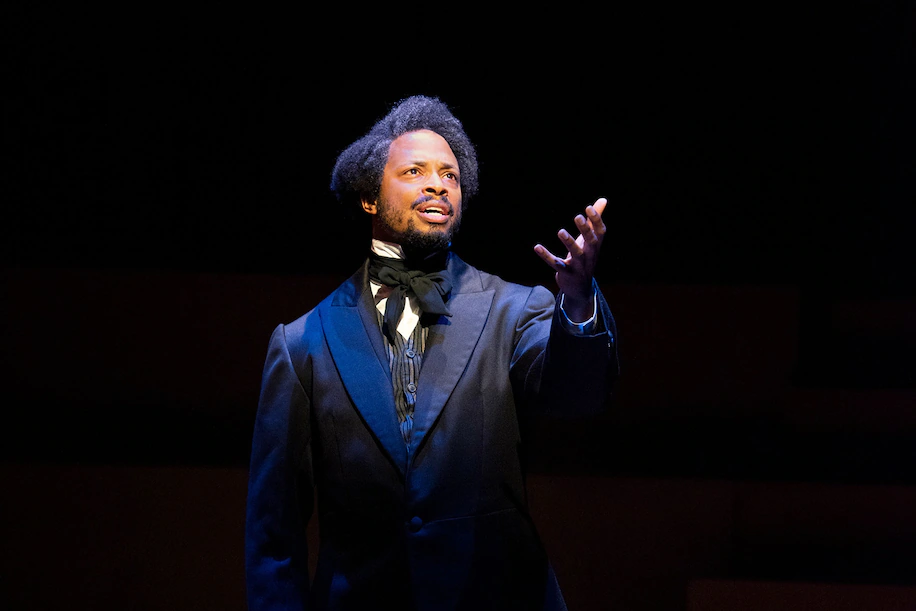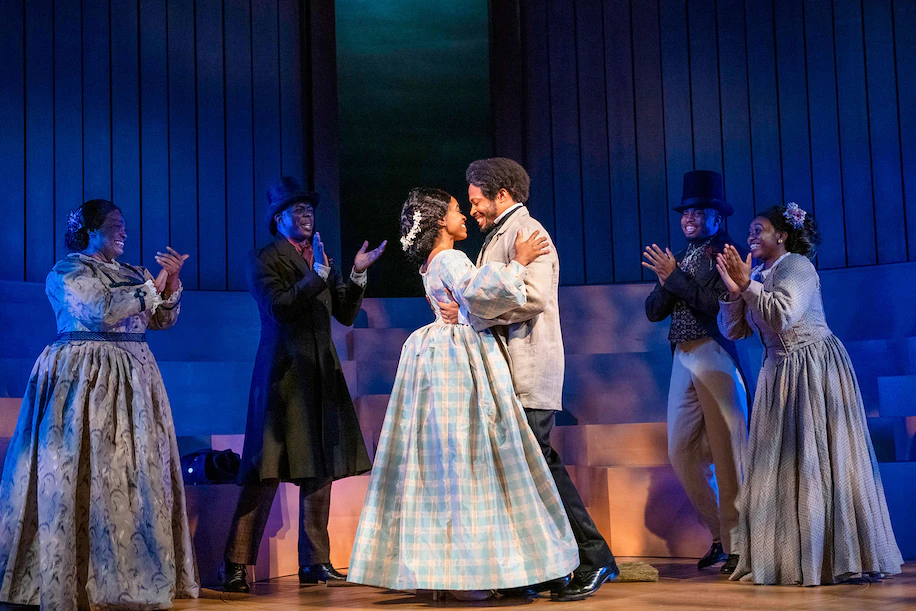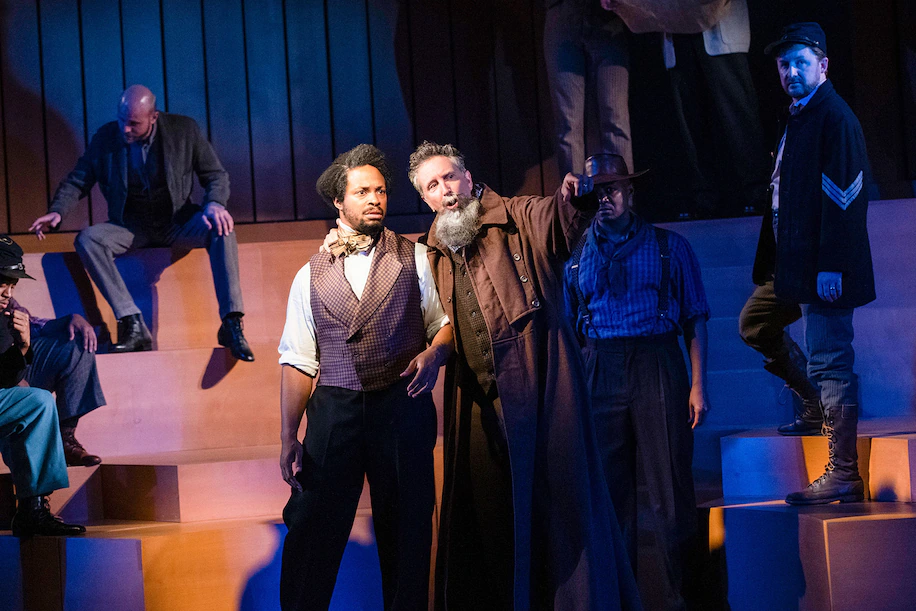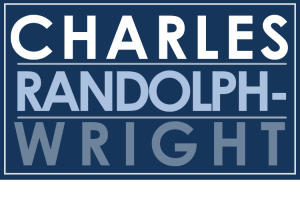In beguiling ‘American Prophet,’ Frederick Douglass lets freedom sing
/0 Comments/in American Prophet, For Theatre, News /by Divatamer Updates
The new musical, with vivid central performances by Cornelius Smith Jr. and Kristolyn Lloyd as Frederick and Anna Douglass, channels Douglass’s power through some astute culling of his journalism, autobiographies and speeches. (Its subtitle is “Frederick Douglass in His Own Words.”) The conceit invests the work of Hummon and co-book writer Charles Randolph-Wright — who also supplies excellent direction — with historical accuracy. It also gives them a lyrical leg up, as there is undeniable music in Douglass’s elegantly persuasive turns of phrase.
“We need the storm, we need the whirlwind, and for the nation’s sake, we need the earthquake,” Douglass and the ensemble sing, in the stirring chorale, “We Need a Fire.” As a first-act finale, the song — incorporating some twists on Douglass’s phraseology — is a kind of motivational summation of the experiences of the young Douglass, after escaping slavery and making an extraordinary ascent to ever-greater influence. When the song is reprised at evening’s end, the lyrics will seem to travel through time in Arena’s Kreeger Theater to implore us to continue the fight against racism and injustice.
A worshipful dimension of “American Prophet” cannot be denied: Music director Joseph Joubert sits at a keyboard below the lip of the stage, his back to the audience, as if he were the church organist, and Arnulfo Maldonado’s terraced, wood-paneled set could support a heavenly choir. A sense of putting Douglass’s best foot forward carries over into the narrative, which is careful not to portray the great man as anything but dignified. It’s not so much a flaw on this rewarding evening as an indication of a need for some loosening up — more humor — in the show’s next incarnation. Some additional poetic license might also be called for to convey the toll Douglass’s outspokenness took on him and his family, for instance, and what vulnerability might be touched in such a strong-willed crusader, in such lethal times.
The musical chronicles the first half of Douglass’s life, from his enslaved childhood in Maryland, where he’s taught to read by a sympathetic White woman, to his activist years leading up to the Civil War and a White House encounter with Abraham Lincoln (Thomas Adrian Simpson). The backbone of the story — and according to the musical, the woman who reinforces his spine — is Anna, who is played by Lloyd with such dazzling presence that Douglass’s wife emerges as a star, too. (Costume designer Dede Ayite’s marvelous dresses, with pinched waists and full, flowing skirts, assist aptly in the magnetism.)
 Kristolyn Lloyd and Cornelius Smith Jr. as Anna and Frederick Douglass in “American Prophet.” (Margot Schulman/Arena Stage)
Kristolyn Lloyd and Cornelius Smith Jr. as Anna and Frederick Douglass in “American Prophet.” (Margot Schulman/Arena Stage)
Smith makes for a winningly virile, impassioned Douglass. The other star here is Hummon, a fixture in Nashville’s country music community, who has found a ravishing musical language to match Douglass’s. “American Prophet” started several years ago as a modest song cycle, performed in a Tennessee church, and the production’s roots in oratorio are still apparent. With jazz, blues and bluegrass motifs, his score abounds in authentic American flavors, underscoring a central point of “American Prophet”: that despite Douglass’s professed ambivalence about this country, he was not just a hero, he was an American hero.
Hummon grants Smith and Lloyd a radiant number at their first meeting at a Baltimore dance: “Children of the Same River,” about their common connection to Maryland’s Eastern Shore. And Chris Roberts, nuclear-charged as firebrand abolitionist John Brown, receives well-deserved opportunities to shake up an audience in the rousing “We Need a Fire,” as well as a spirit-raising anthem, “Hands,” to spur on Brown’s uprising.
The musical’s score, accompanied by a seven-member orchestra, often unfolds with only brief bits of dialogue. The approach requires the score to rapidly incorporate momentous pivots in the Douglasses’ story, such as his escape from slavery, or Anna’s involvement in the Underground Railroad. As a result, an audience member will reap the most satisfaction entering the Kreeger with some knowledge of Douglass’s astonishing life.
 Cornelius Smith Jr. as Frederick Douglass and Chris Roberts as John Brown in “American Prophet.” (Margot Schulman)
Cornelius Smith Jr. as Frederick Douglass and Chris Roberts as John Brown in “American Prophet.” (Margot Schulman)And because so much of “American Prophet” hews to Douglass’s own words, any shift of focus is a bonus. One of the more interesting interludes is a musical account of how Douglass adopted his surname. In the Act 2 song “Mr. President,” too, Hummon has the inspired idea of musicalizing the regrets of three Black leaders who meet with Lincoln and make the mistake of not speaking their minds to him.
“We all come from somewhere else, Mr. President!” sings the trio (played by Christopher B. Portley, Correy West and Curtis Wiley), to the alluring choreography of Lorna Ventura. “That’s what we should have said!”
You get the sense in “American Prophet” that Douglass himself never left anything unsaid. It’s a credit now to this creative team that enshrining him in a musical means his words will never be unsung.
American Prophet, music and lyrics by Marcus Hummon, book by Hummon and Charles Randolph-Wright. Directed by Randolph-Wright. Choreography, Lorna Ventura; music direction and orchestrations, Joseph Joubert; set, Arnulfo Maldonado; costumes, Dede Ayite; lighting, Rui Rita; sound, Dan Moses Schreier. With Erica Aubrey, Cicily Daniels, Kanysha Williams, Christopher Michael Richardson, Kurt Boehm, Brendon Schaefer, Zoe Bryant. About 2 hours 15 minutes. Through Aug. 28 at Arena Stage, 1101 Sixth St. SW. 202-488-3300. arenastage.org.



Leave a Reply
Want to join the discussion?Feel free to contribute!